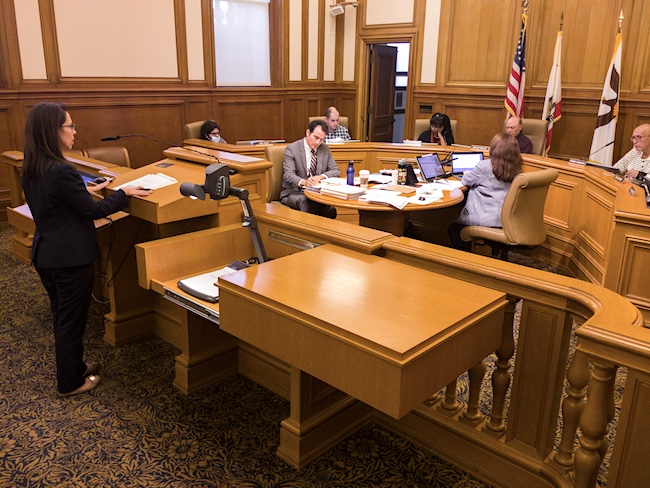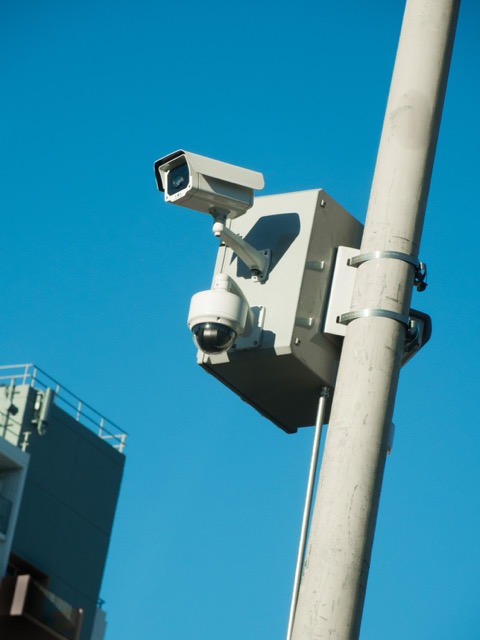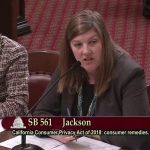This article was updated Nov. 16 and appears in the winter 2019 print edition of the Public Press.
Is weaker government transparency a trade-off?
In the wake of the Cambridge Analytica-Facebook scandal, and a steady barrage of new data breaches, the public has been clamoring for tighter regulation of their personal information. At the heart of the tech industry, Bay Area residents are often the guinea pigs for startups, with unknown and unpredictable side effects.
On Nov. 6, San Francisco voters approved what supporters say will be the toughest data-protection policy of any U.S. city, even going beyond California’s landmark Consumer Privacy Act, which takes effect in 2020.
Proposition B, which passed with 57 percent of the vote, will cover data collected both by government agencies and by any private entity doing business with the city — from Facebook, Google and Uber, all the way down to a bike shop, toilet-paper supplier or street vendor.
The city administrator will draft the policy in the next few months, which will then be shaped by input from the Board of Supervisors, the public, privacy advocates, and major technology and business interests. The implementing legislation must be submitted to the board before June.
“It’s time that San Francisco and the nation start actually evolving policies where your location can’t be tracked without your consent,” said District 3 Supervisor Aaron Peskin, who authored Proposition B. “This is a teachable moment. San Francisco can lead the nation in privacy-first policies.”
The Charter amendment, which was put on the ballot by a unanimous vote of the Board of Supervisors, had split advocates and groups that are normally allies — and that otherwise enthusiastically support 99.9 percent of the measure.
The opposition came primarily from journalists and open-government advocates. They’re concerned that a small subsection of the measure, only 36 words long, could water down San Francisco’s legendary Sunshine Ordinance, which mandates transparency in city government. They argue — and Peskin and the city attorney dispute — that the language could give the mayor and Board of Supervisors the power to restrict access to public records, meetings and ordinance oversight without voters’ approval.
Notably, there was no vocal objection from Silicon Valley, which appears to be holding its fire for the rulemaking process.
The Guiding Principles
So what exactly does Proposition B propose? It contains 11 principles that will apply to city officials, departments, commissions, boards and “other entities”; all contractors and lease holders, and anyone with city-issued licenses, permits or grants. Many principles exceed the scope of the new state law, including:
- Opting out of handing over personal data but still receiving a company’s services.
- The right to move about the city and not be tracked without consent.
- Discouraging the collection of personal information regarding race, religion. sexual orientation, disability and other potentially “sensitive demographics.”
- Anticipating and mitigating bias in data collection and the use of algorithms.
But exactly what the policies will look like is still unknown. Now that Prop B has been approved, the principles will simply guide the city administrator in writing a new ordinance that must be presented to the Board of Supervisors by May 31. Public hearings will follow before the board votes.
“This proposition is just really a stepping stone,” said Sameena Usman, with the Bay Area Council on American Islamic Relations, or CAIR. The group endorsed Proposition B, and is most interested in how any resulting privacy legislation would address surveillance.
“When you have local cities that might be gathering this surveillance data and potentially sharing it with the federal government, that’s very concerning,” she added, noting the Trump administration’s interest in tracking Muslims. Her hope is that Proposition B could lead to a separate surveillance ordinance.
Big Desire for Digital Privacy
Data protection remains a major issue in the Bay Area. A May 2018 Silicon Valley Leadership Group survey of 1,843 voters in five counties found that 86 percent were concerned about the security of the personal and financial data they’ve given to companies or placed online. More than two-thirds have had their data compromised, and more than half the respondents supported more government regulation of how companies use that information.
Among all voters, 51 percent backed more regulation, 34 percent preferred about the same degree of regulation and 8 percent wanted less. Liberals were far more likely than conservatives to favor tighter regulations (57 percent versus 38 percent). Both about equally supported no change (38 percent for conservatives, 33 percent for liberals), while conservatives were six times more likely than liberals to want less government intervention (3 percent versus 18 percent). By comparison, a Reuters national poll in March found that 46 percent of adults supported increased regulation, 20 percent said current laws are sufficient and 17 percent wanted less regulation.
“In an ideal world, Congress would have taken this up, but most of the congressional action has not been helpful,” said Shahid Buttar, with the Electronic Frontier Foundation. “It has fallen to states and cities to innovate and to protect innovation and to protect user rights.”
In the past few years, Oakland, Seattle and Chicago have adopted privacy programs. California legislators went further in June, passing the nation’s strongest privacy safeguards, which Gov. Jerry Brown signed. The California Consumer Privacy Act includes a European-style “right to erasure” of one’s personal information, and permits consumers to sue for damages after data breaches. But many advocates say more is needed.
The Right to Retain Your Data
“Tech is neither good nor bad; it doesn’t have a built-in morality,” said Peskin. “Right now, companies know literally everything about you.”
Crucially, he added, whereas the new state privacy law will allow customers to opt out of their information being sold, the principles in Proposition B allow opting out of that information being collected in the first place. Even if a consumer didn’t consent to share private financial or personal information, those companies will still be required to make their services available to San Franciscans.
“If you deny, you should not be denied the service,” Peskin said. “If you are not willing to accept their standards, you should still be able to use Facebook or to get your scooter ride.”
The privacy policies of Skip and Scoot, which were recently granted permits to operate rentable electric scooters in San Francisco, differ significantly on this point. While Scoot’s terms of service state that customers’ “user name and profile picture may be publicly available and that search engines may index your name and profile photo,” Skip’s has an option more in line with Proposition B’s principles, allowing customers to “use the Services without providing us with information.”
“Should Proposition B prove successful … it could go a long way towards informing the kind of a regulatory frameworks you could see emerging from other jurisdictions,” said Buttar, of the Electronic Frontier Foundation, who evaluated the measure while it was being drafted.
The First Amendment Coalition and the Society of Professional Journalists Northern California support Proposition B’s intention to enhance privacy protections, but campaigned to defeat the measure because of concerns about potential harm to the city’s voter-approved Sunshine Ordinance and its task force, an 11-member body charged with protecting the public’s interest in open government. They were joined in their opposition by the League of Women Voters San Francisco and the San Francisco Labor Council, among a dozen other groups. The San Francisco Green Party, Republican Party and Libertarian Party were also opposed.
Task force chair Bruce Wolfe calls the ordinance “one of the strongest in the country, if not the world,” primarily because of the option of an “immediate disclosure requirement” — a 24-hour deadline for the city to provide requested information, and a focus on accountability of individuals, not just a particular department or agency. (Public Press Publisher Lila LaHood is a task force member.)
Pro-Transparency Culture
Reporter Matt Drange has first-hand experience with the Sunshine Ordinance’s benefits. He said that while doing a story on gunshot-surveillance technology for the Center for Investigative Reporting he was able to easily get data from the San Francisco Police Department that was not forthcoming from other Bay Area cities.
“There is a definite pro-transparency culture that I think it’s helped to shape,” said Drange, who co-chairs the Freedom of Information Committee of the Northern California chapter of the Society of Professional Journalists. “And that’s what we’re most concerned about losing.”
That fear refers to one particular sentence in subsection (i), on the fifth page of Proposition B. Although the Sunshine Ordinance is not mentioned, it’s the reason those disputed 36 words were included, Peskin said.
All parties agree that the 19-year-old ordinance needs to be updated, but because it was approved by voters, they would also have to authorize any changes. San Franciscans for Sunshine member Richard Knee wrote that his group hopes to put a package of reforms on the November 2019 ballot. “But it’s a struggle because the group doesn’t have sufficient funds to gather enough voter signatures,” he said. (Knee, a freelance copy editor for the Public Press, co-authored the official ballot argument against Proposition B.)
Most pressingly, one of the task force’s members must be nominated by New America Media, which was founded by legendary journalist Sandy Close and closed in November 2017. Until voters approve a change for that process, the seat will remain empty, hampering the body’s work.
Peskin said the language in subsection (i) will allow the Board of Supervisors to replace New America Media with another entity. The supervisors could also make other bureaucratic fixes to the overall ordinance should they arise. It reads:
… the Board of Supervisors is authorized by ordinance to amend voter-approved ordinances regarding privacy, open meetings, or public records, provided that any such amendment is not inconsistent with the purpose or intent of the voter-approved ordinance.
“We were trying to do a solid for the sunshine advocates,” said Peskin’s aide Lee Hepner.
But sunshine advocates complained that they weren’t consulted on the wording.
The phrase “intent and purpose” is central to the debate, said First Amendment Coalition Executive Director David Snyder.
“That’s a very subjective, squishy phrase,” said Snyder, who served as the Sunshine task force’s attorney from 2010 to 2012. “It’s kind of a circular thing: ‘Consistent with the intent and purpose’ means whatever the Board of Supervisors deems to be ‘consistent with the intent and purpose.’”
Added Drange, “Essentially it would give them the power to check themselves. We’re handing over the authority that currently rests with the public and saying, hey, if you guys want to make changes to the ordinance, go ahead.”
‘Fears Are Misplaced’
Although the First Amendment Coalition was officially opposed, Snyder still believes “the overall stated purposes and the overall purpose of Proposition B is a laudable one.”
“I doubt that that sentence was put in there as a kind of intentional poison pill,” he added. “But the problem with wording like that is that it can ultimately be used that way, regardless of what the original intent was.”
Peskin said worries about an attack on the Sunshine Ordinance are unfounded.
“I think they’ve misread it,” said Peskin of the journalists’ organization. “I respect them, but I think that their fears are misplaced.”
He and the measure’s supporters, including the San Francisco Democratic Party and the San Francisco League of Pissed Off Voters, maintain that the language is clearly in support of open government.
Peskin said the phrase “is not inconsistent with the purpose or intent of the voter-approved ordinance” means that no changes could be made to the task force, or the Sunshine Ordinance itself, that didn’t maintain its strength.
“The sentence is very clear,” Peskin told the Public Press. “It cannot in any way diminish the purposes of Sunshine.”
“Any notion that public records laws may be weakened is not only legally impossible, it is a distraction from the important privacy rights that Proposition B would advance,” he wrote in rebuttal to the opponents’ ballot argument.
Before the election, the city attorney supported Peskin’s notion, saying in a written statement that upon passage of Proposition B, “we will advise the City Administrator, Supervisors and Mayor about any proposed privacy ordinances that could impact the Sunshine Ordinance to help ensure they are consistent with the voters’ intent.”
‘The Ship Had Sailed’
But Drange said the journalists’ organization was “caught off guard” in July when it learned how Proposition B might affect the task force.
“It was already on its way to the printer,” Drange said. “The ship had sailed in terms of trying to get it altered or get it removed.” The Society of Professional Journalists already submits names for two of the 11 task force seats, and had been part of previous conversations seeking a fix for the New America Media vacancy.
“It’s bizarre that no one in government let us know,” he said.
Drange said there have been “attacks on the task force” in the past, and he fears a future Board of Supervisors could change its makeup for political reasons, or in other unproductive ways. “They could add a representative for tech companies,” he suggested.
“There was a purge of many members of the task force back in 2012 who had publicly disagreed with a couple of the supervisors at that time, and a couple high-profile cases,” said Drange. “And then following that, the SPJ nominations for task force members in 2014 were actually delayed for months.”
Task force chair Wolfe said they were “not notified at all” and learned about subsection (i) when it was too late to suggest different language. “We had to find out from members of the public and from open-government advocates,” he said.
Peskin’s office also pointed out that the measure’s text was publicly available for 60 days, and noted the irony that groups focused on transparency didn’t take advantage of that window.
Tech Watching, Waiting
Facebook didn’t take a position on Proposition B. “We look forward to working with policymakers in San Francisco on finding approaches that protect people and support responsible innovation,” the company said in a written statement.
Hepner said Facebook and several other tech companies initially approached Peskin’s office when they heard a privacy policy was in the works. But they “stayed out of opposing it, probably because they would like to know how the trailing legislation forms” next spring.
The American Civil Liberties Union and the Electronic Frontier Foundation spoke with Peskin’s office during the drafting process but took no position on the measure.
While digesting election results, it’s important to remember that the passage of Proposition B didn’t change any laws, just cleared a path toward new policies.
“For the sake of expediency in getting some simple amendments changed,” the measure “could be helpful,” said Wolfe, the chair of the Sunshine Ordinance Task Force. He was “neutral” on the measure, “because the meat of it is so important.”
But “transparency is extremely important these days,” he added. “These laws are really important and they need to be protected with the utmost of care.”

An audio version of this article was produced by “The California Report” on KQED (88.5 FM).










